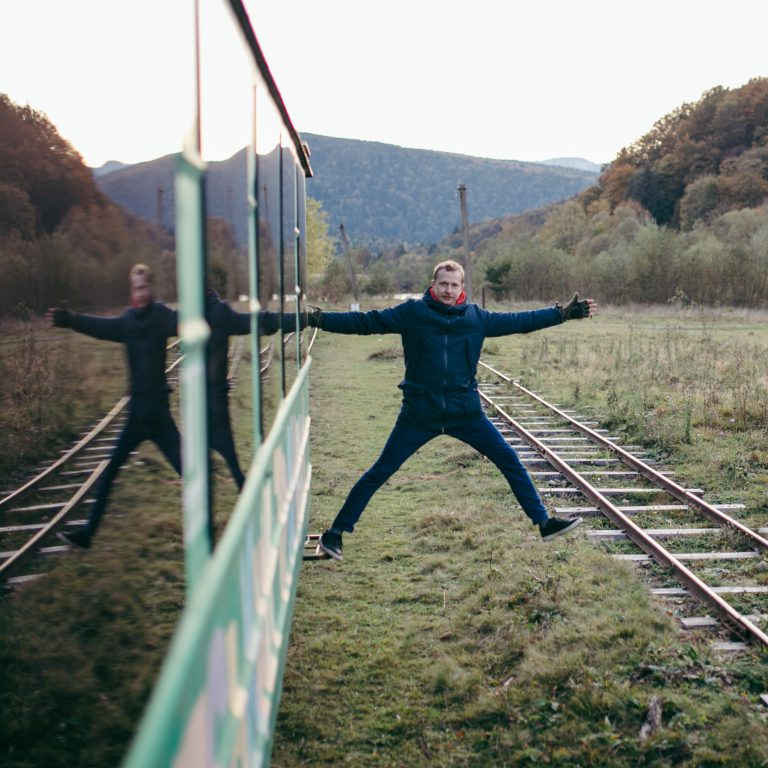In the Ambassadors project, famous people show the towns where they grew up: what they were like in the past, and how they have changed. In the twelfth episode, the TV presenter and journalist Roman Vintoniv (better known as Michael Shchur, his comedy alter ego), will introduce us to his native Dolyna.
In this town not far from Ivano-Frankivsk, you can enjoy the view of the mountains, learn about the culture of the Boiko ethnic group, and if you visit the neighbouring village of Vyhoda, you can ride the Carpathian Tram. Accompanying Roman on this trip was Bogdan Logvynenko, the founder of the Ukraїner project.
— Do you often visit Ivano-Frankivsk?
— I rarely come to the Ivano-Frankivsk region — once a year, maybe even less.
In 2017, entrepreneur Yurko Fylyuk and his partners took inspiration from the Urban Space project and are now turning an abandoned Soviet plant, Promprylad, in the centre of Ivano-Frankivsk, into a modern business complex, involving investments from individuals and businesses. The project has become an example of the impact investment model, in which investors support a social initiative and, in doing so, become co-owners of the plant. As the reconstruction of Promprylad advances, the value of each investor’s share grows.
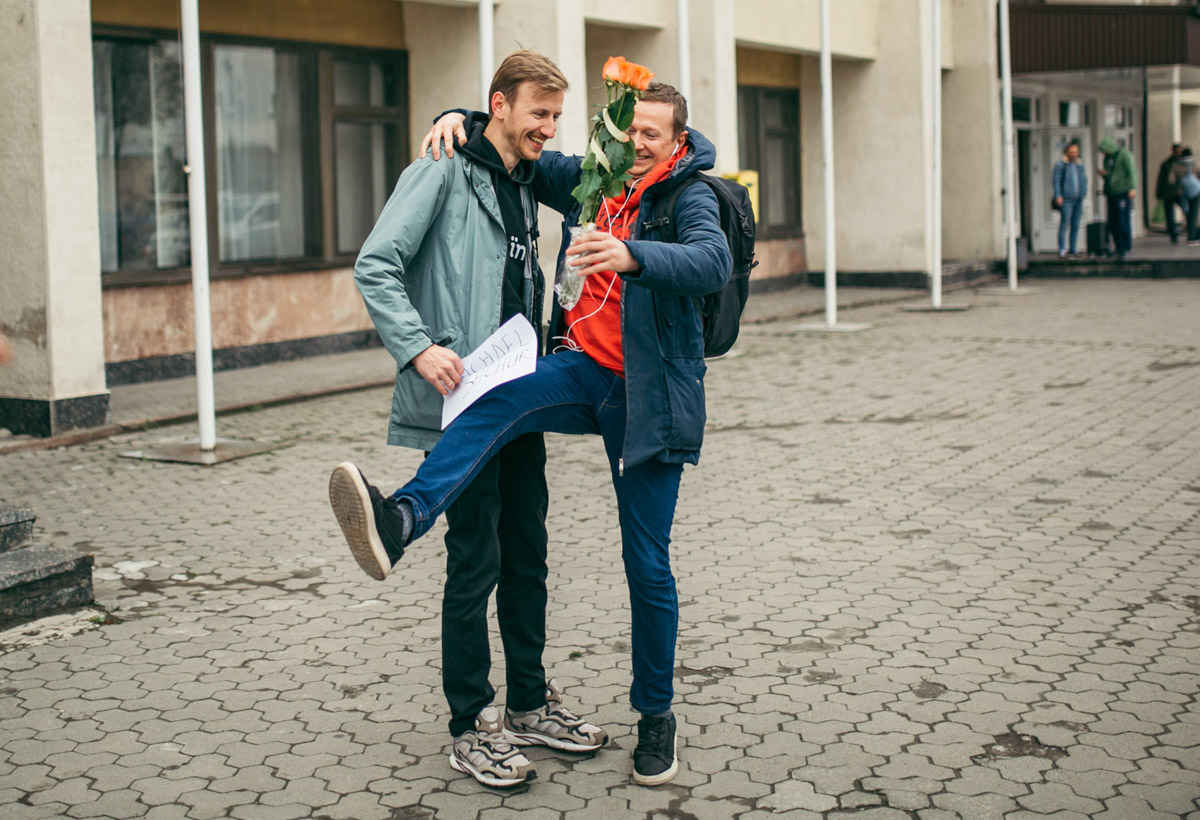
The innovation centre of urban development created on the plant premises works in four directions: education, art, new economics, and urban design. The territory of Promprylad.Renovation is gradually being rebuilt for offices, laboratories, workshops, coworking spaces, an exhibition hall, and an entertainment centre.
Renata Nalysnyk, the communications manager of Promprylad.Renovation, mentions that alongside the rebuilding and renovation, they are taking the site’s historical value into account, and trying to preserve it: “In the past, the plant used to produce rotary gas meters and other instruments. When we acquired this plant, it was no longer producing anything, and the production was loss-making. We cleared the plant’s debts and are now trying to restore everything we can. We produce the same gas meters and cooperate with Kazakhstan: they are our only buyer at the moment. Umbrellas also used to be produced here, and it is said that the umbrella factory might have been a cover for a military production facility: every plant in Ukraine used to produce something for military purposes. Still, the umbrellas were really high-quality. We are thinking of trying to make an umbrella here, at the plant, because the machines have been preserved well. That would be really symbolic.”

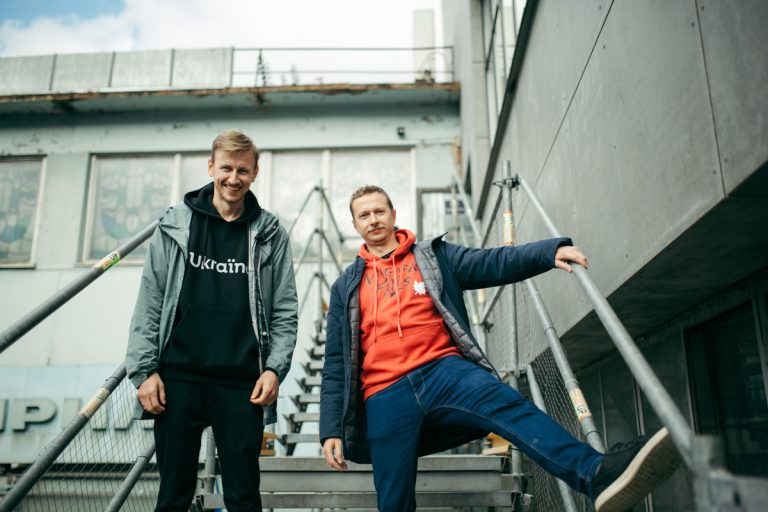
slideshow
— Have you ever been to Promprylad before?
— I was here in the summer of 2019 for the first time. My cousin, Khrystyna Vintoniv, lives in Ivano-Frankivsk. We came here with family, went for a walk here, she showed us around.
— Can you imagine yourself as an investor in this project?
— I saw an ad on Instagram that you can invest in Promprylad. I even bookmarked it to read later. Not for the sake of the plaque, even though that would’ve been awesome. But it’s unlikely that I’ll find as much money as those investors who have their plaques installed here. I definitely won’t. But I considered it, I seriously considered investing some money in this.
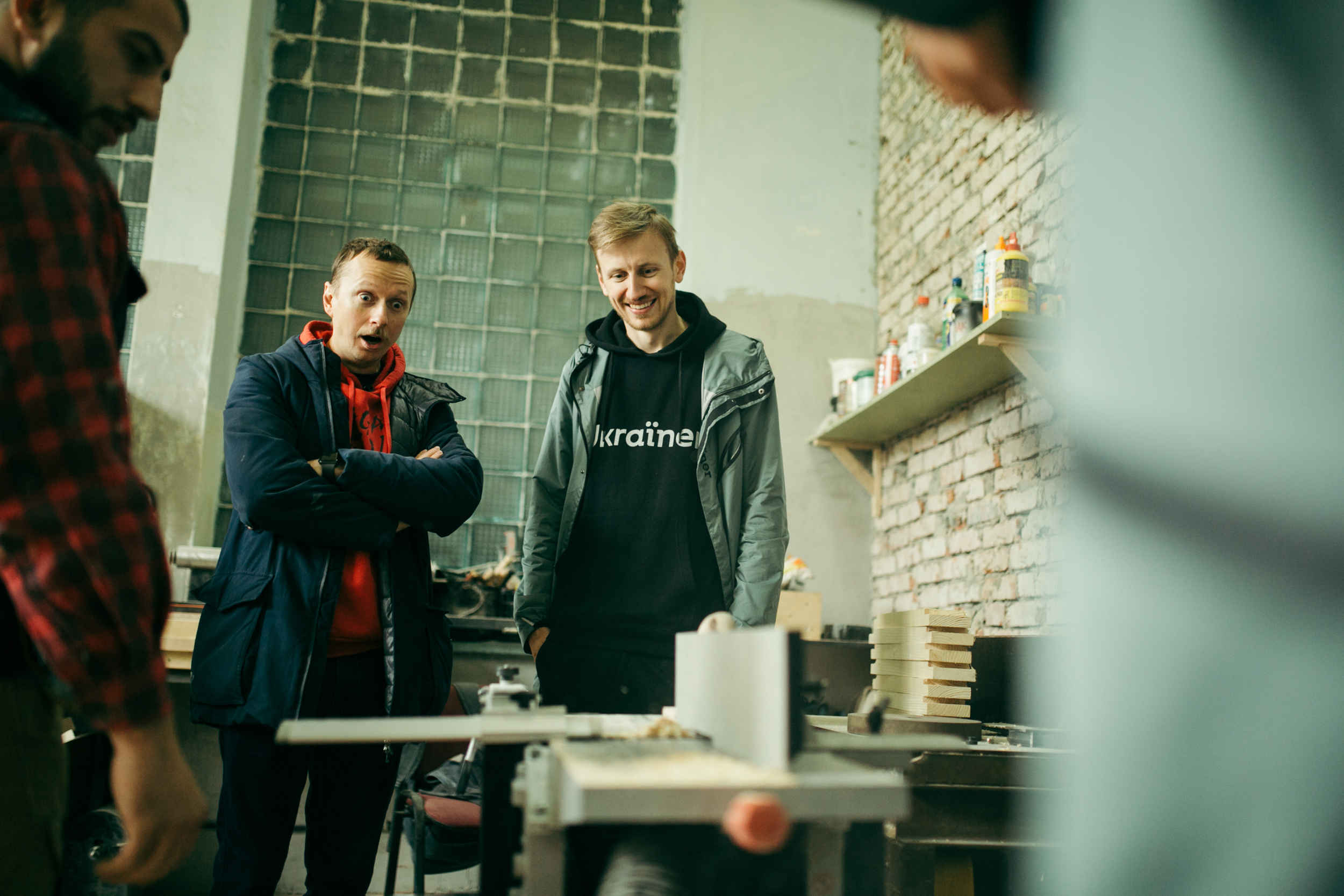
The project Promprylad.Renovation also involves the creation of open workshops on-site, where anybody can implement their ideas. There is a plan to create a sewing workshop here, as well as to equip a space for wood and metalwork. Dmytro Strachuk, one of the craftsmen at ‘Stoliari’ (Ukrainian for ‘carpenters’ — tr.), says that this space is going to be the first one in Ivano-Frankivsk where tools will be available to everybody: “We’re creating a coworking space for craftsmen, for those who are looking for the space and the tools to make something with their hands. It’s also a place for students of technical schools who can’t work in their workshops late in the evening after classes. We went to technical schools too, and remember having to make things in the basement, on the balcony, while the boys from the dorm were working quietly at night.”
— Have you ever made anything out of wood?
— Yes. A friend of mine used to explain how to do it, and I would make furniture at home in the evenings. I made my kitchen furniture. Half of it was made of particle board, and half was made of wood. I started with particle board, and then bit by bit moved over to wood. I can make some simple joints, but I’d have to learn more to make the more complicated ones.
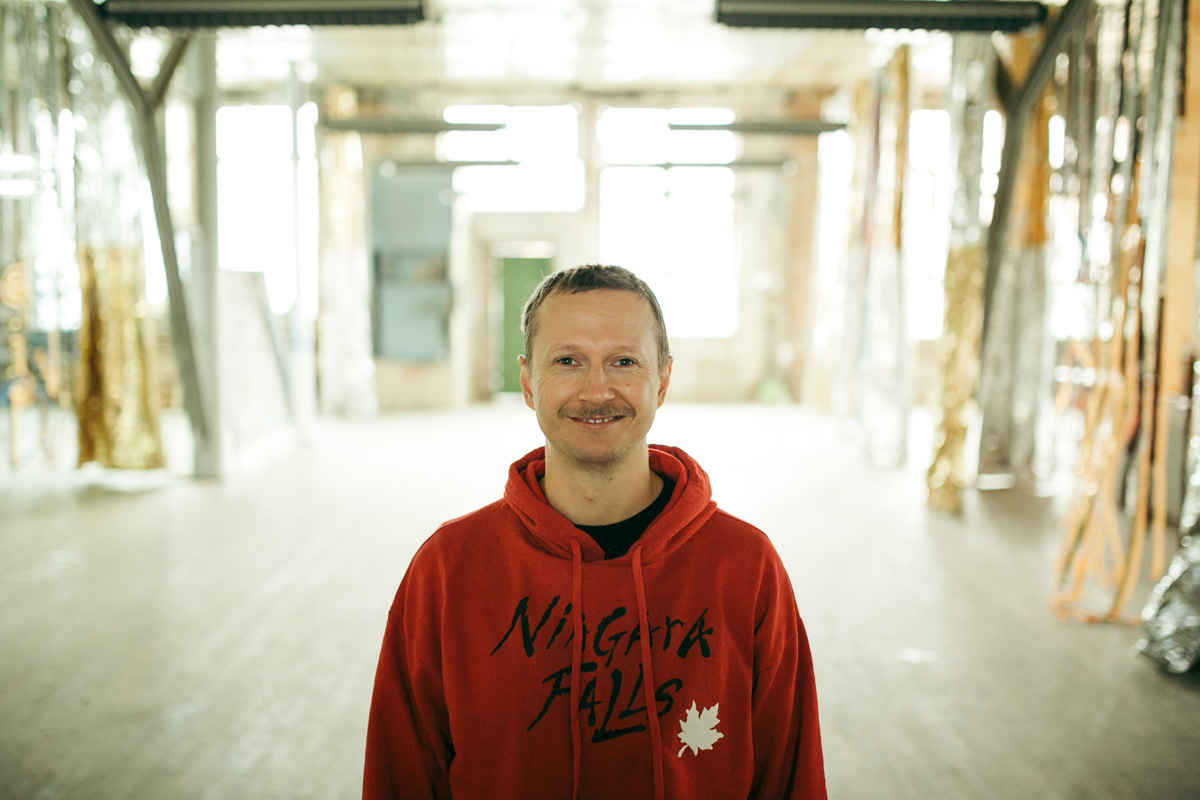
— Tell us about your childhood. Where were you born?
— I was born in Kazakhstan, in the city of Karaganda. All my relatives on my mother’s side lived in Kazakhstan. When my maternal grandpa and grandma were around 13 or 14 years old, they lived near Dolyna. Then, all their families were exiled by the Soviet authorities to Kazakhstan, where my mother was born. She really wanted to go to Moscow to study ballet, but Grandma redirected Mum’s itchy feet to Ukraine instead, where her relatives lived. My mum came to the village and met my father, and they got married. Mum was still studying in Kazakhstan and would fly back for the exams. On one of her trips to Kazakhstan, I was born. They brought me here when I was three months old.
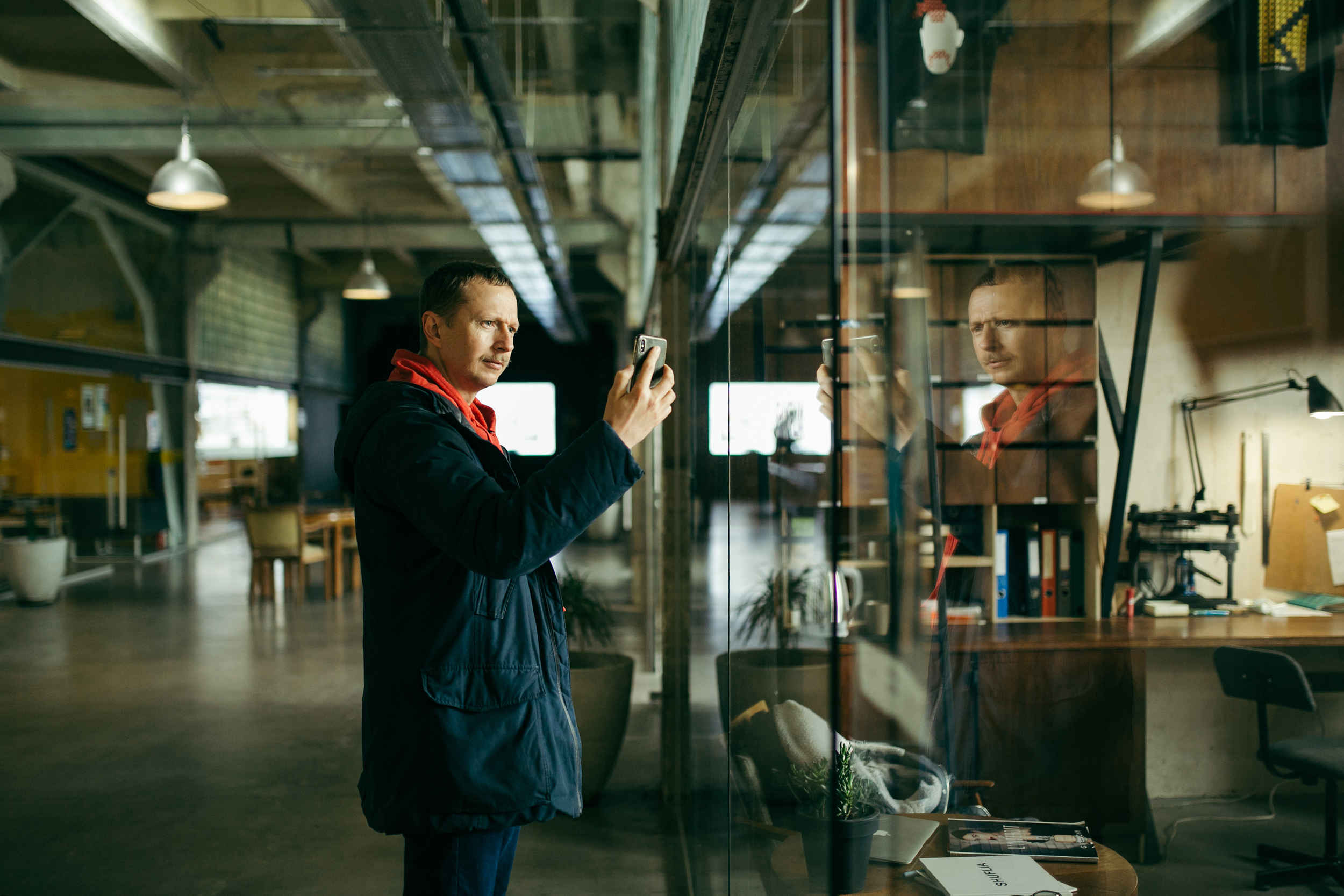
— How long did you live here?
— First, I lived in Rakhynia (a village not far from Dolyna — ed.). Later, when I was around 3 or 4, my parents got an apartment in Dolyna. I lived there until I finished school. Then came university (Roman studied journalism at the Ivan Franko National University of Lviv — ed.) and the dorm in Lviv. After graduation, I worked for another year in Lviv, and in 2006 I moved to Kyiv.
— Do you like Dolyna the way it is today?
— I like small towns because you know everybody around, not just your neighbours, but also people from the opposite side of town. It’s also the feelings of security and cosiness!
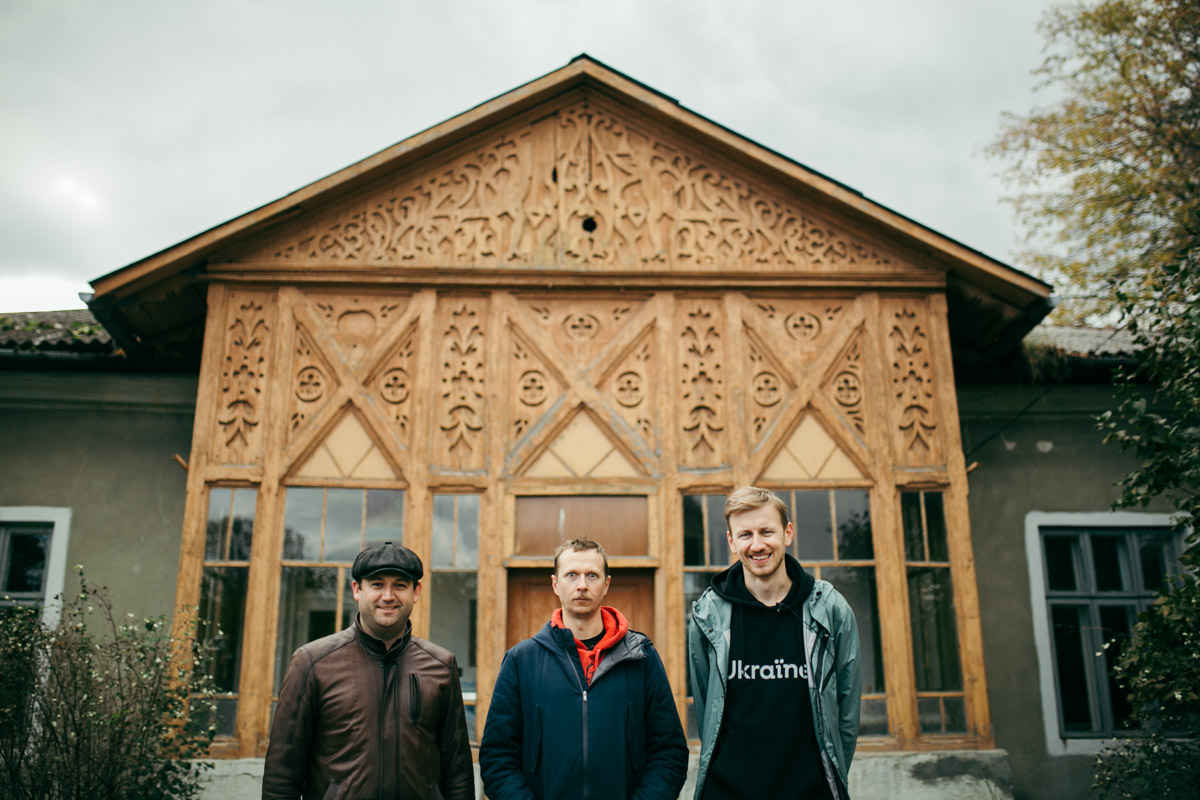
The Boikivshchyna Local History and Culture Museum in Dolyna is the first state-owned museum dedicated to the cultural heritage of the Boiko ethnic group. It was founded thanks to the charitable Omelan and Tatiana Antonovych Foundation. Originally from Dolyna, Omelian and Tetiana Antonovych emigrated to the USA in 1949. In the US, they continued their work for the interests of Ukraine and founded a charitable foundation to support projects in Ukrainian studies, including the construction of the new premises for the Boikivshchyna museum. The museum was opened in September 2003, associated with the First Global Boiko Festival in Prykarpattia region. The museum has five departments: history, natural history, ethnography, religion, and a hall dedicated to the Antonovych family. According to Kseniia Tsyhaniuk, the museum director, the museum has gradually grown into the town’s scientific and educational hub. Art exhibitions are frequently held here, as well as meetups for photographers who capture the ways in which Dolyna is transforming over time: “I believe that our town is the best in the region: it’s in the perfect location. We’re now preparing for the annual photo exhibition. We have come together to show all the photos we’ve taken over the past year. Our album is called ‘Dolyna in the sun’s rays’, and this is already our tenth catalogue.”
— What do you think of the idea of creating photo catalogues about Dolyna?
— What they’re doing is brilliant. These people are creating an environment that gives birth to great projects and ideas. In Kyiv, I’ve never seen elderly people taking photographs, but here they do. The young people too! And that’s awesome, because you’ve got the older ones and the younger ones communicating with each other.
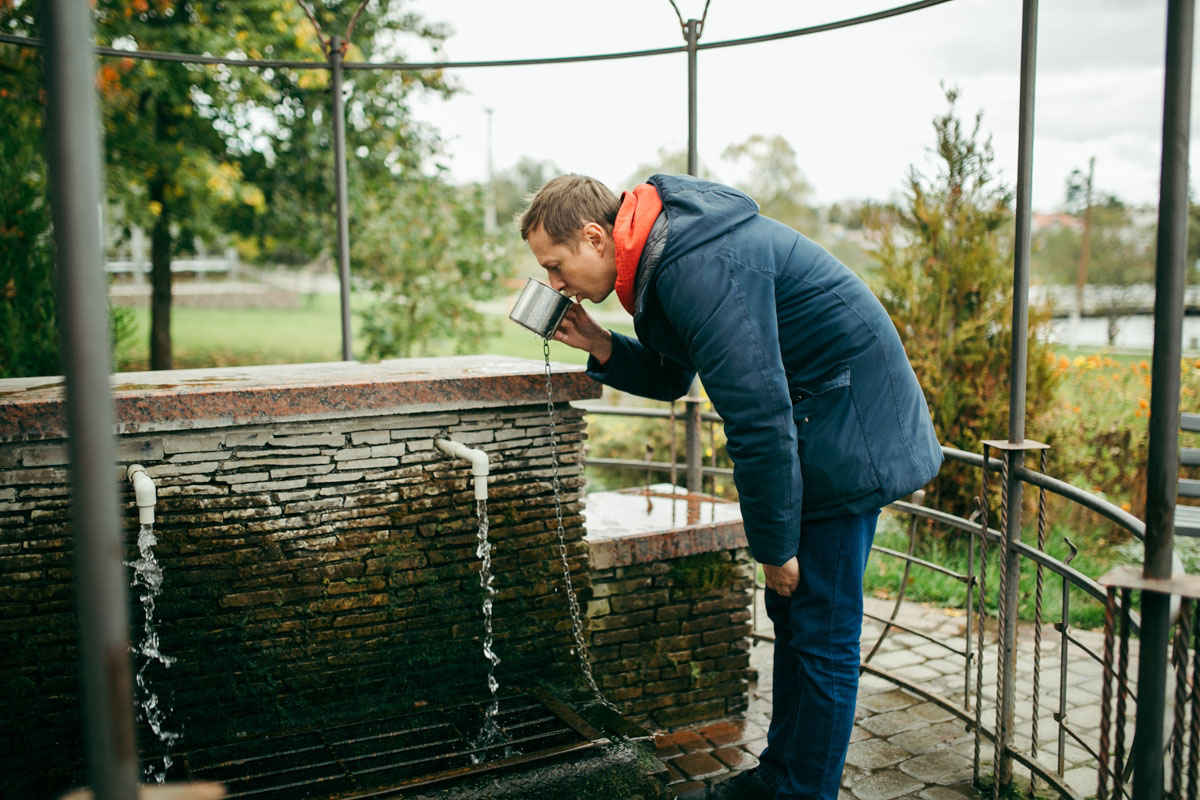
— Why should people visit Dolyna?
— In small towns, you can talk to people. People are more open here than in big cities. Because in big cities there are so many people that they grow tired of each other, while here it’s quite the opposite: people aren’t tired of communication. That’s why here it’s all about sincerity.
— What would you tell foreigners about Dolyna?
— The Carpathians are my most treasured place: the mountains and the rivers are what I like the most. For some time after moving to Lviv, I was still missing the mountains looming on the horizon. Wherever you are in Dolyna, you can see the mountains. It’s so cool.
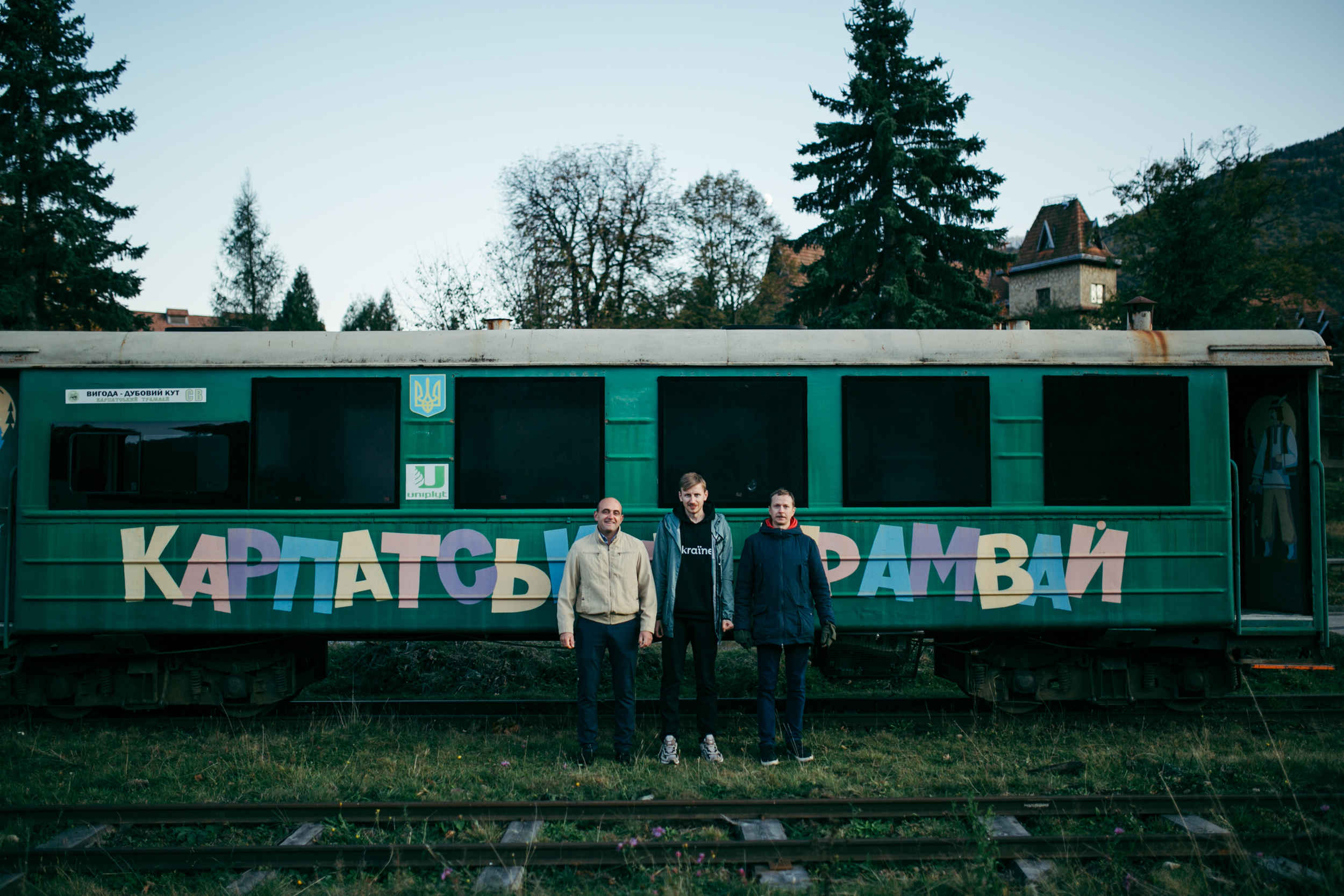
A unique narrow-gauge railway has been working in the Carpathian village of Vyhoda for over a century already. In the 1890s, the Austrians began to build the first 3-kilometre-long narrow-gauge railway branch, running from Vyhoda to the sawmill in Staryi Mizun in the Carpathians. In 1998, severe flooding finally ruined half of the tracks, which were renovated two years later by Uniplyt, a company that produces fibreboard. At that time, only 7 kilometres of the railway were usable; with the company’s contribution, they managed to restore another 75 kilometres, and a freight train started to travel along this line. In 2003, it was named the Carpathian Tram, and has become increasingly popular among tourists. The Carpathian Tram is one of the four narrow-gauge railways that have been preserved. Bohdan Melnyk, the director of the Carpathian Tram project, says that despite the expense of maintaining the rolling stock, the railway must be preserved: “There also was a narrow-gauge railway from Broshniv to Osmoloda, which was dismantled completely in the 1990s. The rolling stock was sold, we managed to buy one tractor unit from them, and the rest was sold as scrap metal. There was a situation once when people from (a Ukrainian ski resort — ed.) came here to take a look at this attraction. They wanted to build something similar, and started to ask around for the prices of constructing a railway. When they realised how hard it was to find the rolling stock, they abandoned the idea, and made artificial lakes instead.”
— Do people recognise you in the street when you come to Dolyna?
— Honestly, I hope nobody cares. I can be myself here — not Michael Shchur, not some journalist. I feel very comfortable, it’s really cool.

— Do you feel that being recognised limits your freedom?
— It really does. I can’t get drunk in the pub — I mean, I have to control myself. If nobody cared about you in the past, then it’s really uncomfortable to be famous.
— Do you filter what you have to say?
— I guess this is exactly what’s been gradually happening to me: my internal censor is getting more powerful. Since so many people read my posts, I feel a lot of pressure. I need to write less nonsense, but sometimes I’m only human, and that’s what I think. We all write nonsense sometimes, but I’ve learned my lesson several times in that regard. As a result, I sometimes don’t write anything, because I need to do a fact check.
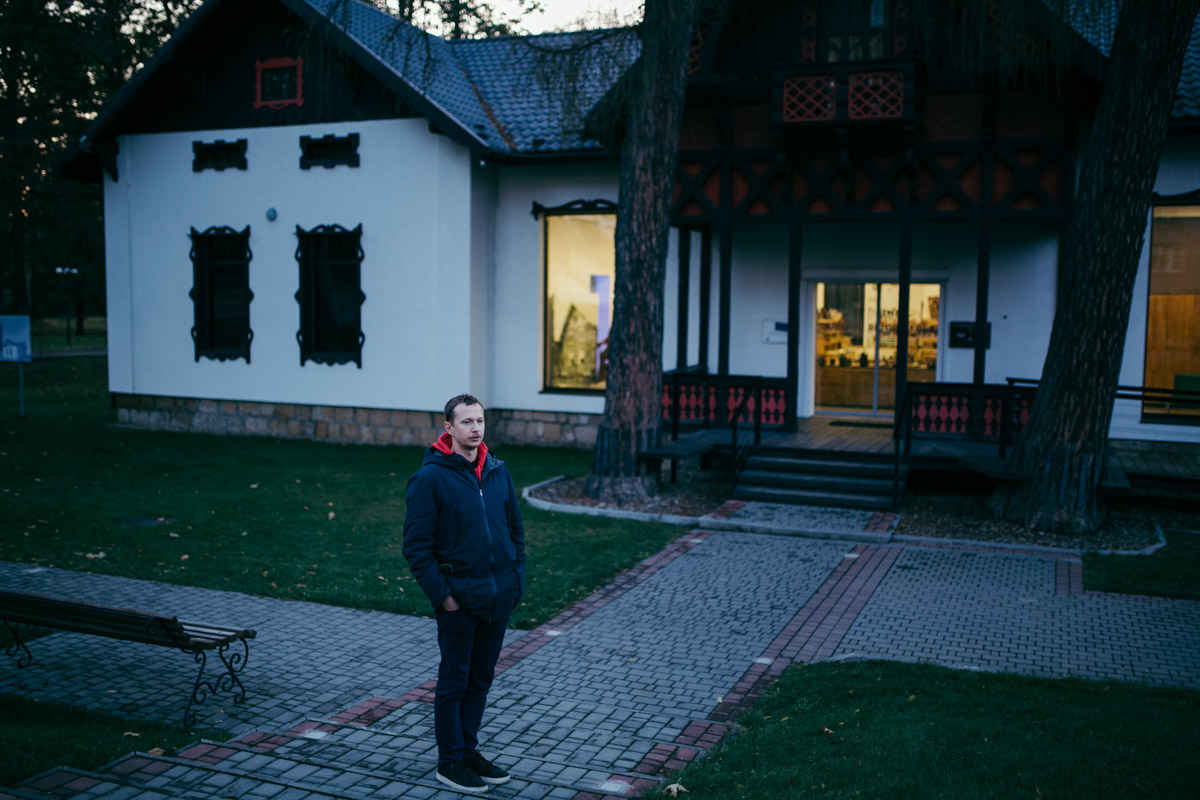
— What was the biggest load of nonsense you’ve written?
— Oh, there’s been a lot. There was something about EU number plates (on second-hand cars, registered abroad and brought into Ukraine without paying the customs duty or changing the registration — ed.), and something else. When you take a position which seems right to you, and then… Three days later, you see the other side of the story or get more information, and you’re like “right, sorry, these guys are OK, it’s those guys who aren’t”, and a few days later you change your mind again, and then again. And then you wonder why you got involved in the first place, and wish you’d kept quiet. And after that you don’t write anything, but you analyse it for a long time, study the question. It’s a whole science: you can’t just produce an analysis if you have no idea what it’s all about. Or you can’t take a sensible position. So I’m more and more inclined to avoid writing about topics I’m not an expert on.
— Was it easier to come up with a character, so that you can feel a sense of relief when you take off the mask?
— The point isn’t being able to spout nonsense, then take off the mask, and everything goes back to normal — that’s stupid! I don’t want to be embarrassed when I take off the mask. Fortunately, the moustache and glasses help a lot. When I take off the glasses, I stop being Michael Shchur and become simply ‘a familiar face’. Once I was going somewhere by taxi, and the driver was sneaking peeks at me all the way. When we arrived and I was about to get out, he said, “Oh, I know you! You’re that Petro Shchur!” And I said, “Yes, I am.” I have this phobia that somebody will ask, “Oh, Michael Shchur, when is your next album release?”
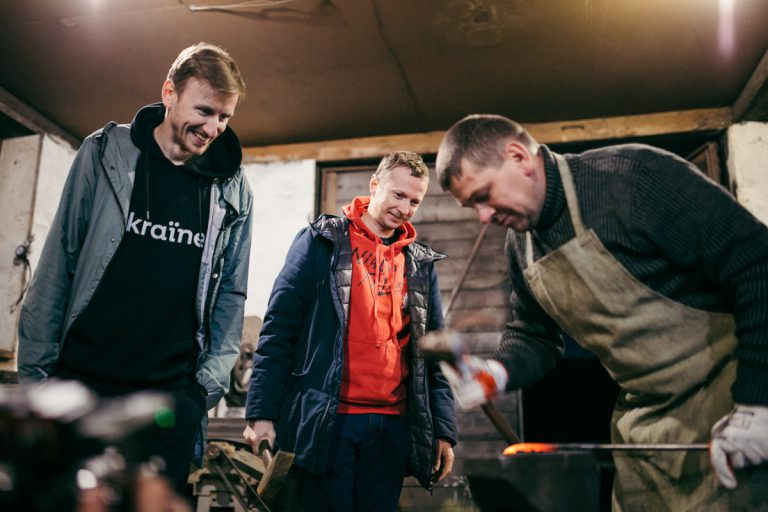
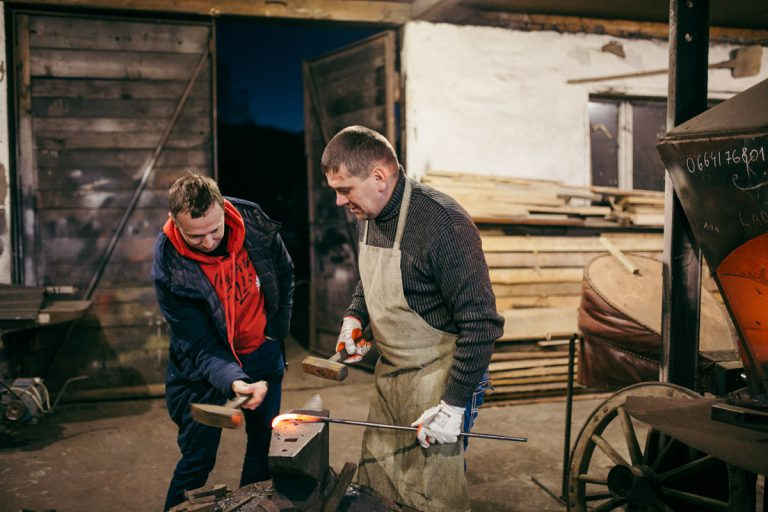
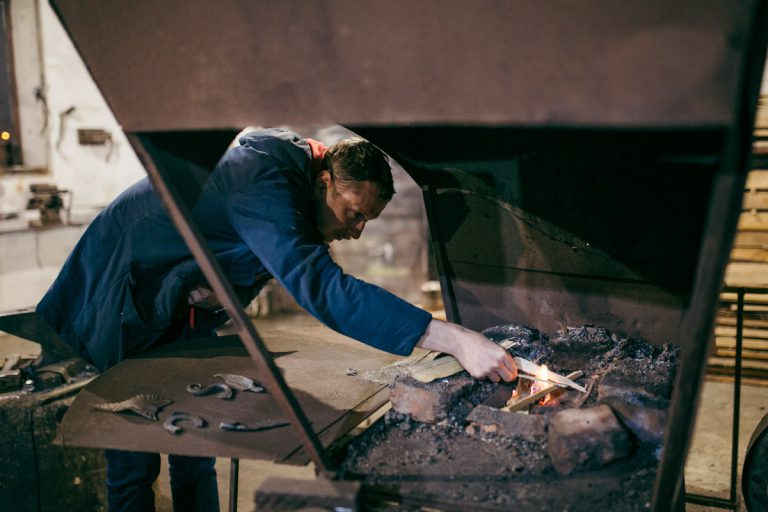
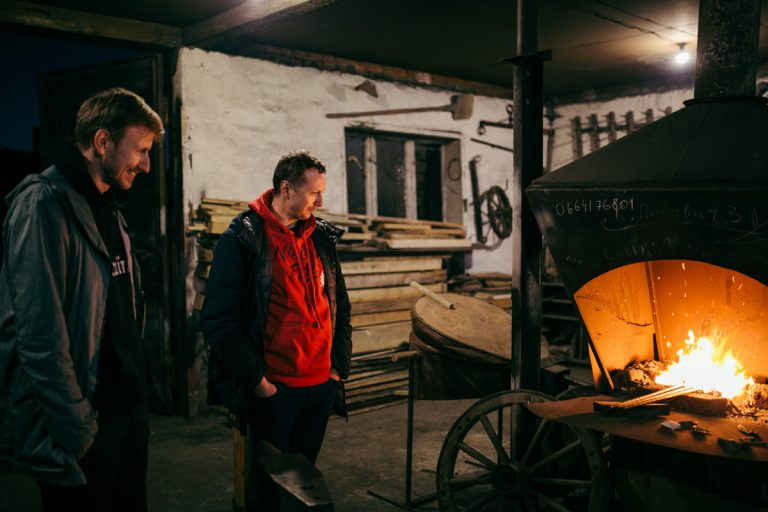
slideshow
In 2013, the Vyhoda Narrow Gauge Railway Heritage Centre opened. It is housed in one of the village’s oldest buildings, a former residence of the Austrian entrepreneur baron Leopold Popper von Podhragy. Here, visitors are introduced not only to the history of the narrow-gauge railway, but also to the natural features of the region and the ecosystem of the Carpathians. The centre’s director, Serhii Andrusiak, believes that what makes the centre unique is the exhibition: “It’s a modern interactive centre, which has no equal in Ukraine in the field of natural science. We use this interesting approach to introduce our visitors to what grows or runs in the Carpathians, tell them about the history of our narrow-gauge railway and how the local timber processing industry was born. Here you can touch, smell and hear everything.”
— How did you come to music?
— Everything began with me being a true pop lover at school. Robert Miles (Italian musician and DJ — ed.), Terytoriya A — pretty typical. At that time, I played the guitar, since I was studying at a music school. But later I gave up because I didn’t learn to play the way I wanted to.
— Why did you give up studying?
— That was another story: I went to music school so that I could play with my classmate Valik. I wanted to play the guitar for the girls. Valik was following his own programme: his parents somehow arranged it, and he was taught to play the chords at once. A year or a year and a half later, Valik was already playing really popular songs about war in the yard, while I was playing those silly children’s songs that we were being taught. Then I realised that wasn’t what I wanted. I gave up studying classical music, found a teach-yourself book, and taught myself to play the guitar.
— How did you start playing?
— I had — and still have — a friend who also wanted to play in a band. We rehearsed, performed at school events, recorded five or seven songs on a tape recorder. Then I went to study in Lviv, where I was invited to join another band. We were called Tracer. Then, our drummer moved to Kyiv, and later I moved too. In Kyiv, the drummer and I started meeting again, and we called the guys who used to play in Lviv too. So we created a new band, Extra! Extra!, recorded a few songs, played gigs. Recently we’ve resumed rehearsals — we’ve already had two or three.
Terytoriya A
Ukrainian daily music chart show on TV.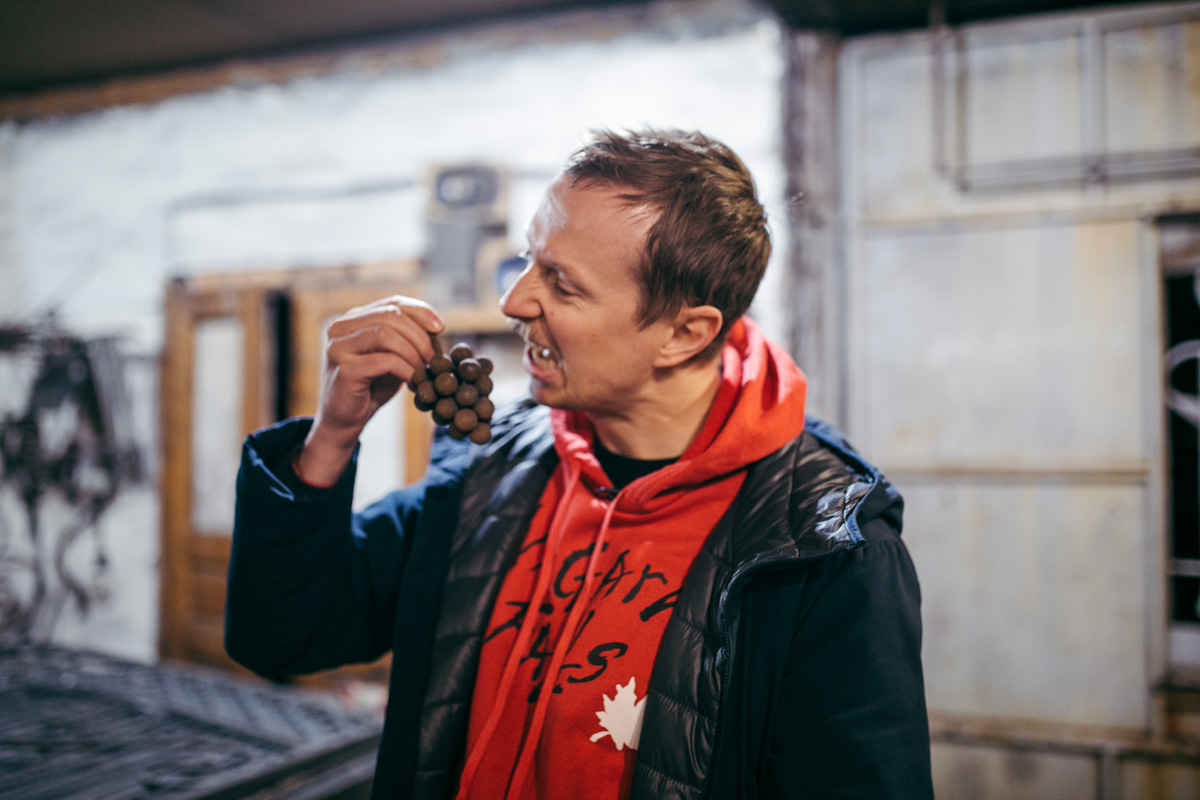
In 2012, Roman Vintoniv created the YouTube channel Toronto Television, where he appears under the guise of a Canadian journalist named Michael Shchur. The channel has featured programmes such as ‘Ale Ie Odne Ale’ (‘But There Is One But’), ‘Vio do Tronu’ (‘Go to the Throne’), ‘Vzhe na Troni (‘Already on the Throne’), and a weekly satirical news digest, ‘Uteodyn’. In July 2015, Roman Vintoniv was called to serve in the Armed Forces of Ukraine; he spent around a year and a half in the 169th training centre in the village of Desna. After his return from the army, Roman and his team launched a new programme called ‘#@)₴?$0’, which is broadcast every Sunday on three TV channels: UA:Pershyi, Channel 24, and Hromadske.
— How did the army change you?
— It became harder for me to pass judgement. My biggest discovery was how our own stereotypes can rule our perception of the world. Before my military service, I was convinced that the army was sheer ‘sovok’ : that they traded everything in for alcohol, that everybody was stupid, swore all the time and dressed in Soviet-style camouflage. I did see all that in the army, but I also saw the real military, I saw people for whom the military code of honour and parade dress uniform really meant something. People for whom an oath was an oath. And that really destroyed my bias. I’m not saying that everybody in the army is a hero. But really, it’s so easy to say something without thinking, to maintain a pointless myth or stereotype.
— If you decided to go on vacation now for a year and a half, would the show #@)₴?$0 be able to continue without you?
— I guess it would. It’s an independent project. It can easily carry on without me. Toronto Television has a few projects: the content on Instagram and Telegram, as well as the shows SHCHE and #@)₴?$0. At the moment I’m hosting one programme, and since September 2019, I’ve been handling the commercial side of the whole project: monetisation, sponsoring, advertising. The team is the Toronto Television project itself, they keep everything going.
‘sovok’
A pejorative word for the mentality and lifestyle characteristic of the Soviet Union.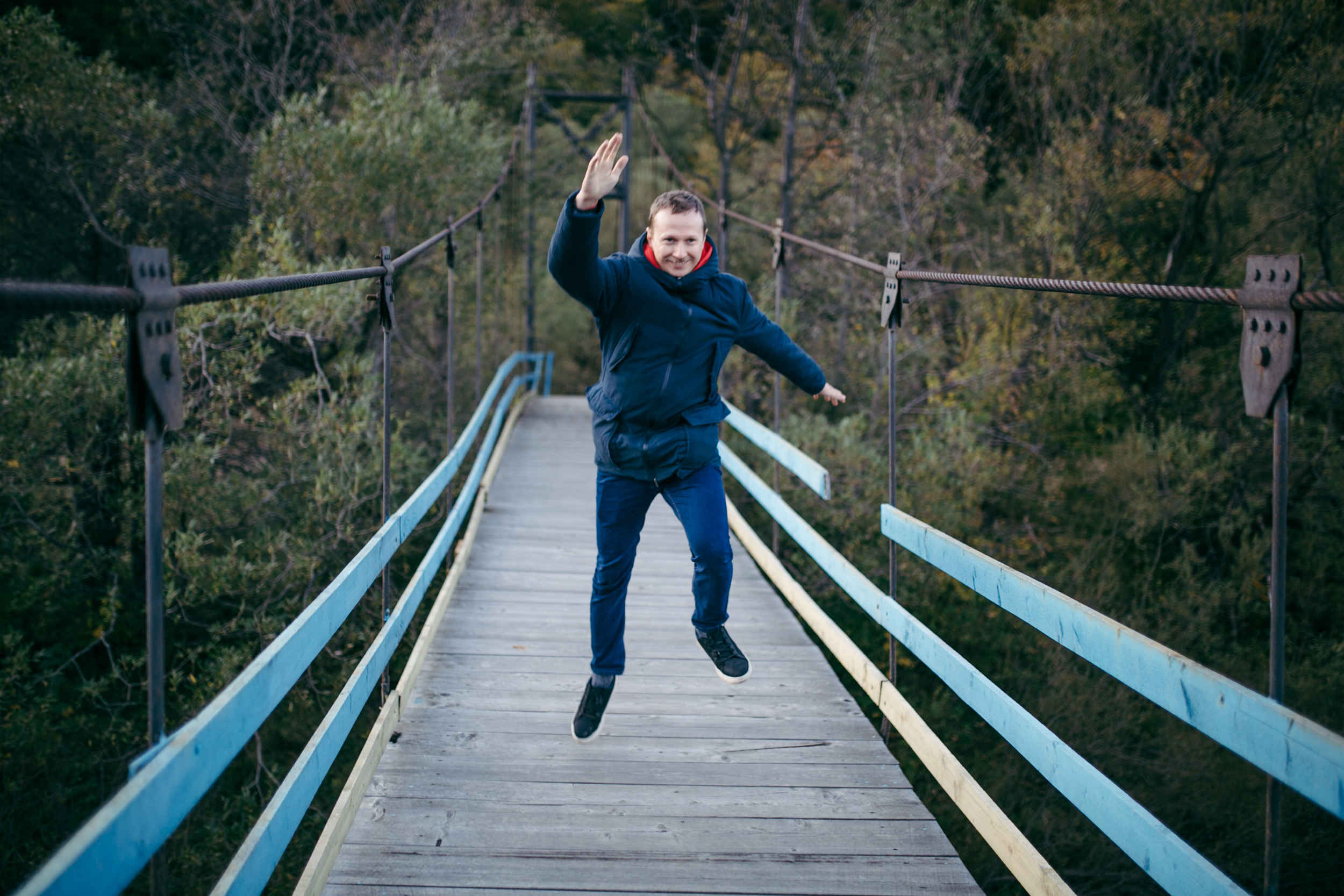
— Did you start trolling on channel 1+1, or before that?
— I think it started on 1+1. Before that, I’d only been doing serious journalism. Then I came to Breakfast with 1+1, where I could do what I wanted. I started coming up with different ideas, and immediately received good feedback. It was fun. I called banks and told them I wanted to secure a loan with silicone breasts as collateral. On World Kindness Day, I wore a Grim Reaper costume and stood outside a metro station handing out tangerines. People were alarmed, but they did take the tangerines. It was so cool! You see how people react in unusual situations, it’s really something else.
— Do the people at 1+1 mind that you’re their ex-employee, and now you’re ridiculing them in your new show?
— No. So what? I’m not ridiculing anyone. I’m showing things as they are.
— At the moment, your show doesn’t pay much attention to Russia, does it?
— No, we don’t. It was the team’s decision: we thought, “Who cares about what’s going on in Russia?” We’d rather watch something about ourselves. That’s what matters! We have problems. Should we laugh just because something bad is happening in Russia? OK. Then what? Dump their events into our minds, worry about it, laugh about it? We have enough here to laugh about and to worry about. So we cover local and global topics. At the moment, we’re just ignoring Russia.
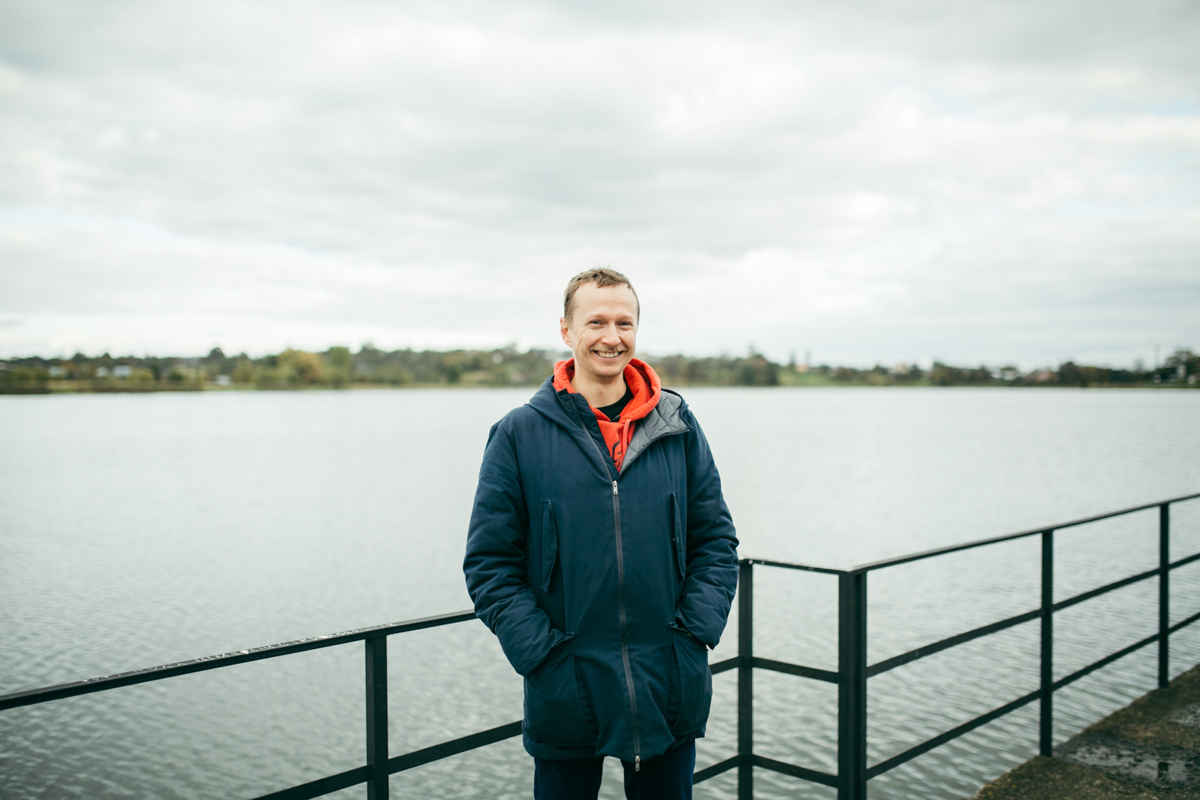
— Is that a conscious decision, in order to avoid touching a raw nerve?
— It’s for the same reason we don’t quote serials or Soviet films. We would like to free ourselves from all that, and free everyone else too.
— Has humour become the Fifth Estate in Ukraine?
— Is humour supposed to have some authority? Humour has existed since time immemorial: just think of all our anecdotes, jokes, Ostap Vyshnia, and so on. Nowadays humour does have an influence on people, but I think that’s always been the case.

